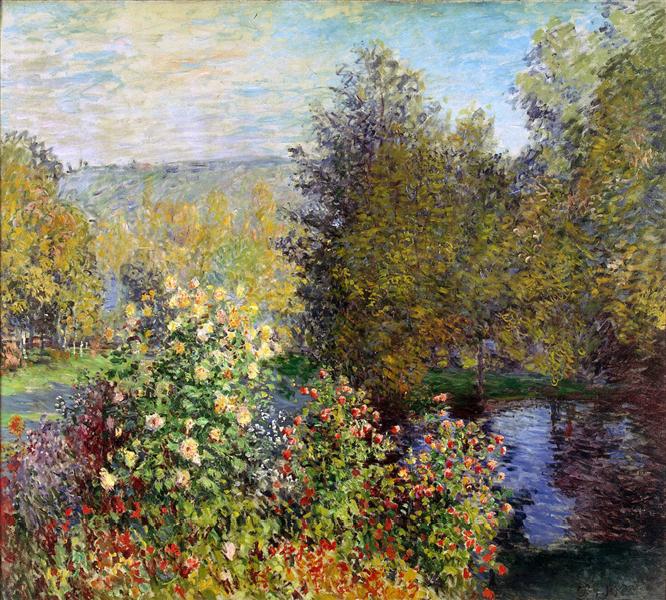תיאור
Claude Monet's 1877 painting "A Corner Of The Garden At Montgeron" sits at the heart of the evolution of Impressionism, a style the artist helped define and popularise in the late 19th century. Depicting a fleeting moment in nature, the work captures the essence of a vibrant garden, full of life and colour, characteristic of the stylistic transformations Monet and his contemporaries experienced in their depictions of the natural world.
From a compositional perspective, the painting presents an ingenious approach to the arrangement of elements. The scene is restricted to a specific corner, where dense vegetation becomes the undisputed protagonist. Monet employs a loose, almost feverish technique, which gives the leaves and flowers a palpable vibration, suggesting the movement of air and the play of light on the vegetal surface. The structure of the work is marked by the use of diagonals that guide the viewer's gaze towards the background, where a beam of light enters the scene, illuminating the elements of the garden in an almost ethereal way.
Colour is a key aspect in this composition. Monet uses a rich and harmonious palette, with deep greens contrasting with the explosions of colour in the flowers. Warm and cool tones dialogue with each other, generating a feeling of freshness and vitality. This colouristic technique is distinctive and reflects Monet's desire to capture not only the visual appearance of nature, but also its feel and atmosphere. The influence of the changing light is evident, as the sunlight transforms the scene, imbuing it with a natural luminosity that is characteristic of the Impressionist period.
Although “A Corner of the Garden at Montgeron” does not feature human figures in a prominent arrangement, the insinuation of everyday life is felt through the painting’s invitation to explore the space of nature. This reflects Monet’s tendency to find moments of intimacy in natural settings, often inspired by his own experiences in gardens and outdoor spaces. Indeed, Montgeron was a place where Monet spent time in search of inspiration, highlighting the personal connection the artist had with his subjects.
The work, like many of Monet’s creations, could be considered a meditation on the very perception of beauty, an invitation to stop and appreciate the details that often go unnoticed in modern life. This corner of the garden is not just a physical environment, but an introspective space that invites stillness and contemplation. The exploration of color and light, together with the representation of nature, underlines a recurring theme in Monet’s work: the transience of time.
In the context of Impressionism, Monet continued the tradition of searching for light and colour, inspiring generations of later artists to break with the conventions of academicism and explore the emotional connection between the artist, nature and the viewer. "A Corner of the Garden at Montgeron" thus becomes a fundamental work that resonates with the energy of its time, encapsulating not only a moment in the garden, but also an indisputable expression of the spirit of nascent modernity in art.
KUADROS ©, a famous painting on your wall.
Hand-made oil painting reproductions, with the quality of professional artists and the distinctive seal of KUADROS ©.
Painting reproduction service with satisfaction guarantee. If you are not completely satisfied with the replica of your painting, we will refund 100% of your money.

